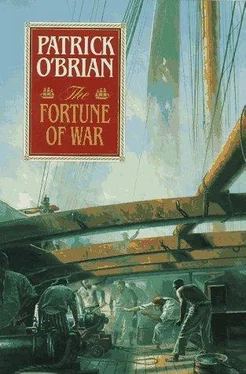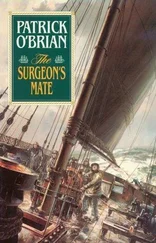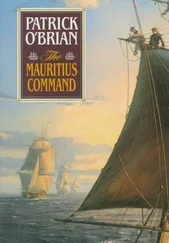Patrick O'Brian - The fortune of war
Здесь есть возможность читать онлайн «Patrick O'Brian - The fortune of war» весь текст электронной книги совершенно бесплатно (целиком полную версию без сокращений). В некоторых случаях можно слушать аудио, скачать через торрент в формате fb2 и присутствует краткое содержание. Жанр: Книги. Описание произведения, (предисловие) а так же отзывы посетителей доступны на портале библиотеки ЛибКат.
- Название:The fortune of war
- Автор:
- Жанр:
- Год:неизвестен
- ISBN:нет данных
- Рейтинг книги:3 / 5. Голосов: 1
-
Избранное:Добавить в избранное
- Отзывы:
-
Ваша оценка:
- 60
- 1
- 2
- 3
- 4
- 5
The fortune of war: краткое содержание, описание и аннотация
Предлагаем к чтению аннотацию, описание, краткое содержание или предисловие (зависит от того, что написал сам автор книги «The fortune of war»). Если вы не нашли необходимую информацию о книге — напишите в комментариях, мы постараемся отыскать её.
The fortune of war — читать онлайн бесплатно полную книгу (весь текст) целиком
Ниже представлен текст книги, разбитый по страницам. Система сохранения места последней прочитанной страницы, позволяет с удобством читать онлайн бесплатно книгу «The fortune of war», без необходимости каждый раз заново искать на чём Вы остановились. Поставьте закладку, и сможете в любой момент перейти на страницу, на которой закончили чтение.
Интервал:
Закладка:
Yet although the issue of the war as far as it concerned the sailors was a foregone conclusion - the Royal Navy had, after all, spent the last twenty years beating every fleet that was brought against it, taking, burning or sinking the enemy in the mass or in detail wherever he floated - Captain Yorke for one was doubtful, if not despondent, about the outcome on land. If the Americans had beaten the British army in eighty-one they might do so again, particularly as so many of the best regiments were engaged in the Peninsula; and then the French in Quebec could scarcely be expected to show much zeal on the English side. What he feared was a sudden crossing of the border to take the naval base of Halifax from behind. That would be extremely inconvenient; but even so he was quite happy about the naval side. There were the West Indies, there was Bermuda, there were of course the home bases, and he and Jack fell to working out the composition of the squadron required to keep the American navy in check or to destroy it, in the event of a general engagement, on the assumption that Halifax was gone.
They had always taken a keen professional interest in the navies of other powers, even of so young a power as the United States, and when Stephen asked 'What does the American navy consist of, pray?' they were able to answer him at once.
'Apart from their sloops and brigs, they have only eight frigates', said Yorke. 'Eight, no more. It would be stark staring madness to declare war with only eight frigates when your opponents have more than six hundred cruisers at sea, if you meant to do anything in the naval line; but of course their real aim is Canada - they cannot mean to do anything at sea, except for snapping up a few prizes before their ships are taken or blockaded in the Chesapeake.'
'Eight frigates,' said Jack. 'Two of them we should scarcely call frigates at all, nowadays; a thirty-two and a twenty-eight by the name of Adams; then three eighteen-pounders, rated thirty-eight guns apiece, much the same as ours though perhaps a little beamier, Constellation, Congress, and Chesapeake; and then three more, heavier than anything. we have, President, Constitution, and United States, all rated forty-four guns and all carrying twenty-four-pounders. I dare say Acasta will be ordered to the American station to cope with them, together with Endymion and Indefatigable. I shall like that; there is splendid shooting behind Halifax.'
'When you say heavier than anything we possess, do you mean in physical bulk, or in the magnitude of their artillery?'
'I really meant the guns. They have long twenty-fours as opposed to our eighteens - they fire balls that weigh four and twenty pounds, rather than eighteen. Six pound more, do you see?' said Jack kindly. 'But, of course one goes with t'other. The American forty-fours must gauge about fifteen hundred ton, while our thirty-eights are only a trifle over a thousand. Acasta is one thousand one hundred and sixty, if I don't mistake, and she carries forty eighteen-pounders.'
'Would not this preponderance give the enemy a great advantage? Suppose he were to dash his beakhead against you, would not his greater mass bear you down, as the Turks were borne down at Lepanto?'
'Dear Doctor,' said Yorke, 'those are galley tactics. In modern scientific war mere weight does not signify, except that the thickness of your scantlings is some protection to your gun-crews at long range and enables you to carry heavier guns. Yardarm to yardarm, it does not make much odds: an eighteen-pound ball will do just about as much damage as a twenty-four, if the guns are well pointed and well served. When I was third of the Sybille, thirty-eight, we set about La Forte, of forty-four twenty-four-pounders, and when we took her we found we had killed and wounded a hundred and twenty-five of her people, while they only killed five of ours. We dismasted her entirely, too, and lost not one of our own. That was in ninety-nine.'
'And then in Trafalgar year,' said Jack, 'Tom Baker - you remember Tom Baker, Stephen, the very ugly, carroty-haired man with a pretty wife that dotes upon him - Tom Baker, in Phoenix, thirty-six, and an uncommonly small thirty-six, took Didon, forty, in a very bloody fight. But I tell you what, Yorke, it will never do to send too many liners; you cannot expect any frigate, forty-four or not, to come out and engage with a ship of the line. Now I suggest Acasta, Egyptienne...'
Stephen's attention wandered, and presently he took up his 'cello, whispering over the strings. He had made his views on this hurtful, unnecessary war - unnecessary and yet, with such a ministry, perhaps inevitable - clear to Wallis long ago: he was not going to repeat himself. What preoccupied him was the effect it might have upon Diana Villiers, pinned in what was now an enemy country; and upon intelligence. Yet from the point of view of intelligence, he was infinitely more concerned with Catalonia; he longed to be there, and although La Fl�e was at present dashing into the south Atlantic in the same magnificent style as that with which she had traversed the Indian Ocean, he was obliged to command his mind with unusual force to prevent it breaking out into sterile impatience and complaints. He thought that Yorke might well be right about Canada, but he could not care a great deal about the hypothetical naval war. If it took place, many men on both sides would no doubt be killed or cruelly maimed, a great many women would be made bitterly unhappy, a great deal of energy, material, and treasure would be wasted - diverted .from the only real contest -but whatever the event the war would remain a side-issue, a piece of wanton, bloody foolishness. He wished Jack and Yorke would be less prolix, less inclined to neglect music for the American navy: he was tired of their ideal squadrons, their strategy, and their new naval bases.
The American navy was the staple diet of conversation: the American navy day after day after day. To escape it he spent more time on deck or in the mizentop. They were in albatross waters now, running up the cold current to the west of Africa, and long did he gaze for those splendid wings over the long greenish swell. But when the darkness or the cold - and it was unusually cold, so cold that he blessed the day he had landed his marsupials, creatures subject to bronchial complaints -drove him down to the gunroom, there he always found the Americans again, and not only their frigates but every one of their eight brigs and sloops from the Hornet, twenty, to the Viper, twelve, with every wearisome detail of shifting guns and boat-carronades, swivels in the tops and along the gangway.
Here the feeling was quite different. Mr Warner had no fear for Canada, no fear for Halifax; nor did he give a rap for the American navy. And as he was the only man aboard who had fought the Americans, his opinion carried weight. 'When I was a midshipman in the year eighty, sir,' said he, 'serving under Foul-Weather Jack Byron on the American station, we saw a great deal of them. Contemptible, sir, contemptible: they never fought a single action with any credit. Filthy ships: more like privateers than a real navy. But what can you expect of people who think Commodore is a permanent rank, and who chew tobacco on the quarterdeck, squirting their spittle right, left and centre?'
'Yet perhaps they may have improved with the passage of time,' said Stephen, 'I seem to remember that during their abortive little war with France in seventeen ninety-nine their frigate Constellation took l'Insurgente.'
'Very true, sir; but you are forgetting that Constellation carried twenty-four-pounders and Insurgente twelves. You are forgetting that La Vengeance, who carried eighteens, knocked Constellation all to pieces. And, Doctor, you are forgetting that in both these actions the Yankees were engaged with foreigners, not with Englishmen.'
Читать дальшеИнтервал:
Закладка:
Похожие книги на «The fortune of war»
Представляем Вашему вниманию похожие книги на «The fortune of war» списком для выбора. Мы отобрали схожую по названию и смыслу литературу в надежде предоставить читателям больше вариантов отыскать новые, интересные, ещё непрочитанные произведения.
Обсуждение, отзывы о книге «The fortune of war» и просто собственные мнения читателей. Оставьте ваши комментарии, напишите, что Вы думаете о произведении, его смысле или главных героях. Укажите что конкретно понравилось, а что нет, и почему Вы так считаете.












